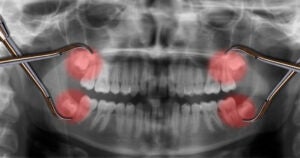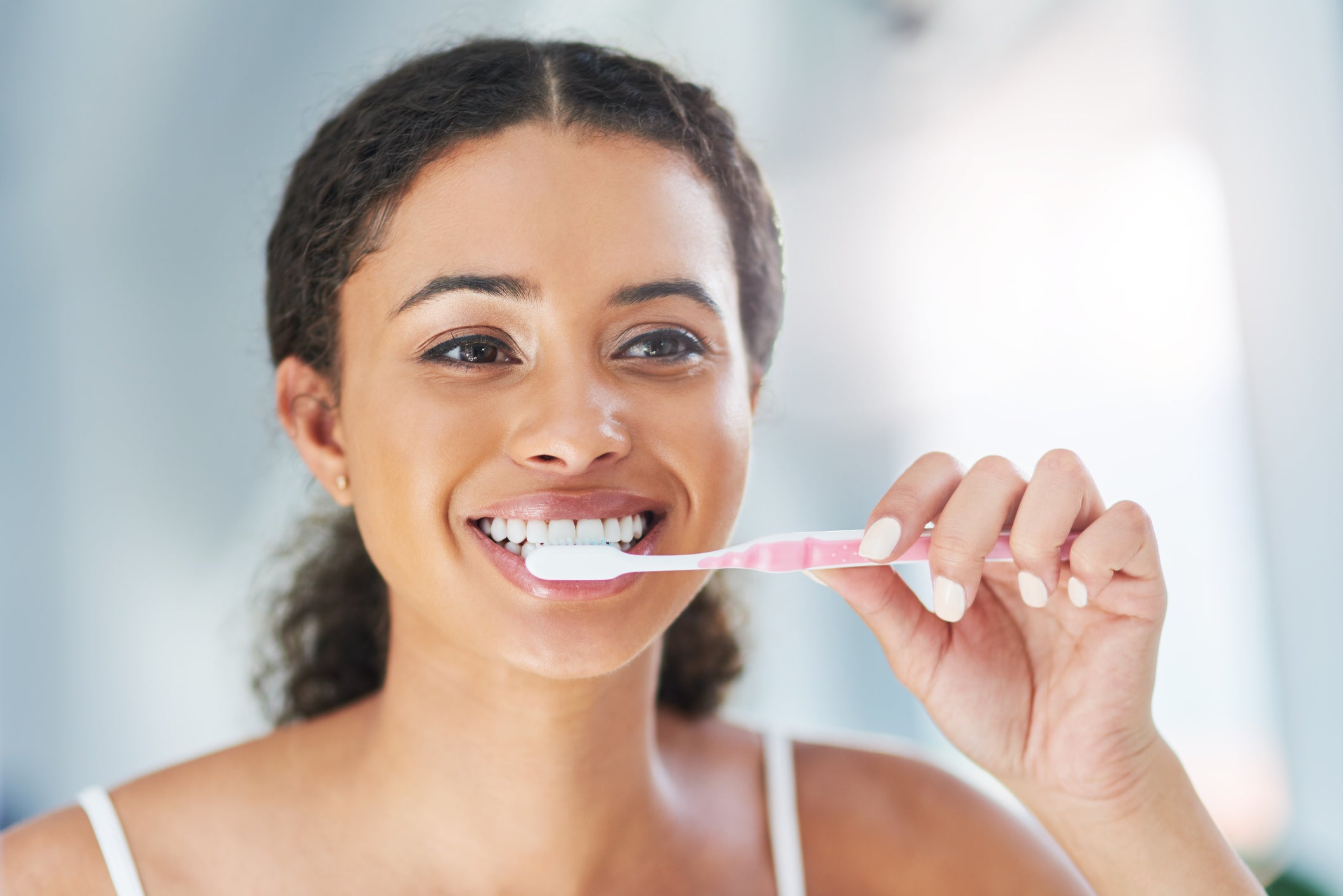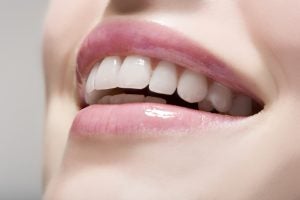-
How Fluoride helps to prevent Tooth Decay

Fluoride helps keep her smile clean, fresh, and strong.
What is Fluoride?
Fluoride is a naturally occurring mineral. It is an element and has been found to protect teeth from tooth decay. Fluoride can be found in the water supply, but it is also found in many foods such as oatmeal, raisins, shellfish, potatoes and others.
How are Cavities Formed?
We all have bacteria living in our mouths. The bacteria feeds on sugars from foods that we eat. When that happens, the bacteria secrete an acid that can cause teeth to decay. That decay of the enamel can have serious consequences, including cavities and even loss of the tooth. The decay of the tooth is called demineralization.
How Does Fluoride Work?
Nature’s Cavity Fighter-Fluoride is a naturally occurring mineral. With a healthy diet and regularly healthy habits it can be used to help prevent tooth decay. It works to build tooth enamel so that teeth are less susceptible to decay because they’re stronger.
Fluoride also repairs tooth enamel after decay has begun. This repair process is called remineralization.
Fluoride Has Been Proven Safe and Effective
Studies have shown that fluoride added to water supplies is extremely beneficial when it comes to cavity prevention. For over 70 years, communities have been adjusting fluoride levels and there is extensive proof that fluoridated water is very effective in the prevention of tooth decay. How is fluoride added to the water supply? Fluoride is already present in the water supply. Most communities adjust the amount of fluoride in the water so that it’s at a safe level but is also effective in the remineralization of tooth enamel.
How Can You Work Fluoride into your Routine?
- Fluoridate toothpaste
Even children as young as age 3 can begin using a fluoridated toothpaste, as long as a small amount is given on the toothbrush. For adults, brushing twice daily with a fluoridated toothbrush will be effective in cavity prevention.
- Fluoridated mouthwash
Mouthwash that contains fluoride has been proven effective in the treatment of cavities. However, it is not recommended to give mouthwash to small children. Fluoride treatment as administered by a dentist, is available to people who are at high risk for tooth decay. This includes people who have poor dental hygiene, those who live in communities with low fluorine levels in the water supply.
- Fluoride in food
Fluoride can be found in many foods, too. This kind of fluoride is called systemic fluoride. Some foods that contain fluoride are grapes, apples, strawberries, grapes, spinach, potatoes, veggies, seafood, tea, coffee, and many more.
Ask your dentist for more information about getting enough fluoride into your routine.
Park 56 Dental
Have questions about fluoride, fluoride treatments, or the best way to get fluoride into your routine? Voted #1 in New York City, the dentists at Park 56 Dental have the answers! Park 56 Dental is known for great dentistry. We provide the best treatments in town from pediatric dentistry to endodontics, oral surgery to prosthodontics, emergency to sedation dentistry. You and your family can count on us to make you feel welcome and comfortable at each visit! Be sure to visit our website or if you’d like to make an appointment, click here to book online or call (646) 679-3989.
-
Why Regular Dental Check-Ups are Essential for a Healthy Smile

Patient getting dental check-up.
Maintaining a beautiful and healthy smile begins with your daily dental routines of brushing and flossing. Yet even the most thorough approach to oral hygiene also requires frequent dental check-ups. Here’s why:
- Early Detection of Dental Issues
Even if nothing seems out of the ordinary, dental problems can sometimes develop without any noticeable symptoms in their early stages. Regular checkups can give your dentist the chance to identify cavities, gum disease and oral cancer at early stages, which can make them more manageable.
- Professional Cleaning
Brushing and flossing alone can’t remove all plaque and tartar buildup. Your dentists at Park 56 can perform thorough cleanings to remove these deposits, helping to reduce the risk of cavities and gum disease.
- Oral Hygiene Education
You may need personalized advice on improving your oral hygiene regimen. Your dentist and hygienist can assess the work you do at home and provide you with tips on how to improve your brushing and flossing techniques. They might also recommend new products or technologies that could be beneficial for your specific needs.
- X-rays and Diagnostic Tools
Special diagnostic equipment can help shine a light on things that you might not be able to detect at home. Hidden cavities, impacted teeth, or bone loss might be lurking out of sight, but regular annual X-rays can give you an inside look to be able to diagnose and repair an issue before it becomes a serious problem.
- Gum Health Assessment
Gum health is an indicator of overall dental health. Early screening and detection of gum disease can provide you with treatment necessary to prevent tooth loss and other problems. Your dentists at Park 56 can assess your gums and help treat or prevent gum disease before it starts.
- Preventing Complications
Regular dental analysis can keep your medical records up to date on your past issue, ensuring that your treatment plan is current and effective. This can give your dental team the opportunity to monitor your progress and maintain a treatment plan that can lead to total wellness and save you time and money on more extensive remedies.
- Oral Cancer Prevention
Your dentist is trained to detect the early signs of oral cancers during routine exams. Anyone can become susceptible to mouth cancers but patients who smoke tobacco or drink alcohol are especially at risk. Early detection can make treatment easier and less invasive, significantly improving chances of successful treatment.
- The Personal Touch
Your dental team at Park 56 take a personal approach to every patient. We take the time to get to know you, your dental history, your lifestyle and your unique needs. Whether you need a simple cleaning, a filling, oral surgery, prosthodontics, sedation dentistry, endodontics, or Invisalign, our dental specialists can customize an immediate and ongoing treatment plan to fit your needs.
Regular dental screenings are essential to your overall oral hygiene plan, and the experts at Park 56 can help you make sure you are staying on track and maintaining your dental health. Give us a call and schedule your next appointment today so you can keep your smile shining bright.
-
Why Do Dentists Encourage You to Have Your Wisdom Teeth Removed?

The human mouth goes through numerous changes over the years. For many people, one of the most memorable milestones is the appearance of the third molars around ages 17 to 21. “Wisdom teeth” are so named because they are the final teeth to appear and come in at a mature age.
When wisdom teeth erupt through the gums correctly, they can help with chewing. However, while there’s no definitive rule, most people have their wisdom teeth removed. Why is this? And how do you know if you should keep your wisdom teeth or not?
Many situations warrant having your wisdom teeth removed. Here are the most common reasons your dentist may encourage you to make this choice.
Fully Impacted Wisdom Teeth
An impacted tooth fails to erupt through the gums, meaning it remains covered by gum tissue. This may occur if your mouth is too small for the tooth to emerge. Dentists usually recommend removing impacted wisdom teeth because trapped bacteria could cause painful cysts or abscesses to form.
Partially Impacted Wisdom Teeth
A partially impacted tooth erupts partway through the gums. Dentists almost always advise removing wisdom teeth in situations like this. After all, the partial eruption makes it easy for bacteria to get inside, leading to swelling, pain, and stiffness in the jaw. Tooth decay is also more likely because it’s difficult to clean a partially impacted tooth.
Overcrowding
Some willful wisdom teeth erupt fully, even if there isn’t room in the jaw. This can overcrowd your mouth and damage neighboring teeth. Your entire smile may even shift, throwing off your bite and causing jaw pain.
Necessary for Your Dental Care Plan
Your dentist may recommend wisdom teeth extraction as part of your overall oral care plan. For instance, if you’re planning to get braces soon, it’s wise (pun intended) to remove problematic wisdom teeth before you begin straightening your smile. And if your wisdom teeth come in after having braces, prompt removal prevents them from undoing all your hard work.
Other Problems
If you decide to keep your wisdom teeth for now, continue to monitor them for signs of trouble. It may become necessary to remove them if issues develop near your wisdom teeth, such as:
- Tooth, jaw, or cheek pain
- Repeated infections
- Gum disease
- Extensive tooth decay
The decision to remove your wisdom teeth isn’t always straightforward. That’s why it’s important to visit the dentist regularly. Routine oral exams and X-rays reveal what’s happening in your mouth so you can take the best course of action for your oral health.
If your wisdom teeth are giving you trouble, visit Park 56 Dental for a consultation. We offer compassionate, high-quality dentistry in the 10022 zip code area of NYC, and we’re confident we can help you make the right choice regarding your wisdom teeth. If you decide to have them extracted, rest assured that we offer sedation dentistry to make you feel more comfortable. Call us at (212) 826-2322 to set an appointment today.
-
What Are Our Teeth Made Of?

Most people know the basics of dental care, but how many of us really know the anatomy of our teeth? Here’s a short overview of what our teeth are made of.
Crown
Quite simply, the crown is the part of the tooth that you can see.
Enamel
The hardest tissue in your whole body is the enamel of your teeth, which forms the outermost layer of the crown. This substance is why your teeth can withstand the pressure from chewing hard foods. It also protects your teeth from harmful bacteria and acids, as well as hot and cold foods. Enamel mostly consists of calcium phosphate, a rock-hard mineral.
Dentin
Right below the enamel is a yellowish material called dentin. It is a hard tissue made of microscopic tubes. When the enamel is damaged or worn away, heat or cold can enter the tooth through these tubes and cause pain. Every tooth is mostly dentin, which is why teeth have a slight yellowish tint. Like enamel, dentin mostly consists of apatite crystals of calcium and phosphate. This makes it hard as bone, but it’s not quite as hard as enamel.
Pulp
Below dentin is pulp, the softest, most alive and innermost portion of the tooth. Pulp consists of connective tissue , nerves, and blood vessels, which nourish your teeth. Pulp has two parts — the pulp chamber, which is in the crown, and the root canal, which lies in the root of the tooth. Nerves and blood vessels enter the root through a small hole in its tip and extend through the root canal into the pulp chamber.
Cementum
Cementum is a layer of connective tissue that secures the roots of your teeth firmly to your gums and jawbone.
A layer of cementum coats the exterior of the root, under the gum line, and binds the tooth into place within the jawbone. Cementum is as hard as bone, but it’s slightly softer than dentin. It consists of about 45–50% inorganic minerals and 50–55% organic matter (mostly collagen and glycoproteins) plus water.
Periodontal Ligament
The periodontal ligament, also called the desmodontium, is a fibrous joint that holds the root of each tooth in its bone socket. The periodontal ligament fibers are anchored in the cementum layer of the tooth and in the alveolar jaw bone. They hold the teeth in a state of sprung suspension, which means that each tooth can move slightly within its alveolar bone socket.
If you’re looking for the perfect place to get your teeth cleaned or fixed, choose the practice that was voted best dentist in NYC! At Park 56 Dental Group, we offer pediatric, prosthodontics, endodontics, oral surgery, Invisalign®, emergency, and sedation dentistry, all at the highest level of treatment. We serve the Midtown, Central Park, Upper East Side, Park Avenue, and all surrounding Manhattan and New York areas, with a patient-centered practice that has hours to fit your schedule. Schedule your complimentary consultation today by contacting us online or calling us at (646) 679-3989.
-
What to Expect During Your First Visit to Park 56 Dental

At Park 56 Dental, we are committed to providing our patients with safe, gentle, high-quality dental care. We understand that you or your child may feel apprehensive about your first visit to our office. That’s why we’ll do everything we can to not only make you feel comfortable but truly pampered during your time with us. Here’s what to expect when you visit Park 56 Dental in NYC for the first time.
Review Your Dental & Medical History
Our first goal during your dental consultation is to understand your health. We will review any records you have from previous dentists, along with the patient information form we ask you to complete. Be sure to provide as much information as possible to accurately convey your health status.
Also, don’t forget to bring your insurance card so you can take advantage of your dental benefits when paying for services. This is also a good time to discuss any dental anxiety you have. Sedation dentistry could be a good option for you, depending on your needs.
Take Digital X-Rays
The next step is to have a closer look at your teeth and gums by taking X-rays. The digital imaging technology we use decreases radiation exposure by 90%, ensuring your safety while also making images available for immediate review. Your X-rays serve as a baseline for your current dental health and help us recommend immediate and long-term treatment options.
Clean and Polish Your Teeth
With digital imaging complete, it’s time to clean your teeth. Here’s what this entails:
- Physical exam: A dental hygienist checks your teeth and gums for signs of gingivitis. If major problems are detected, the hygienist might call in the dentist to make sure it’s okay to proceed with the cleaning.
- Plaque and tartar removal: Using a small mirror to check all surfaces, your hygienist removes plaque and tartar buildup from your teeth. This may involve scraping and spraying your teeth with a high-pressure water jet.
- Polishing: The hygienist polishes and removes stains from your teeth using a gritty paste.
- Flossing and rinsing: The hygienist touches up your smile by flossing and rinsing with water.
- Fluoride treatment: An optional fluoride gel at the end of your cleaning helps protect your teeth against cavities until your next dentist appointment.
Meet with the Dentist
Following a comprehensive teeth cleaning, your dentist will sit down with you to review the findings and discuss any immediate treatment needs. This is your chance to ask questions and discuss any cosmetic dentistry services you’re interested in, including veneers, tooth reshaping, whitening, and more.
Everyone’s busy, but regular dental checkups are an important part of maintaining a healthy smile! In fact, the American Dental Association recommends visiting the dentist every six months. If it’s been longer than this since your last visit, contact Park 56 Dental at (212) 826-2322 to schedule your first appointment with NYC’s best dentist. We have over 20 years of experience serving patients in the 10022 zip code area.
-
How to Find the Perfect Dentist

When you’re looking for a dentist, the number of options available can be overwhelming. Factor in anxiety about going to the dentist, and it’s easy to see how finding a dentist could seem like a daunting task. Don’t worry! We’ve got some tips to help you find the perfect dentist for you and your family.
- Ask people you trust. Word of mouth can be the most effective way to find the right dentist. Make a list of dentists recommended to you by family members, close friends, co-workers, and your primary care physician. Don’t worry too much about whether the dentists are in your network; you can often maximize your insurance benefits out of network. Armed with your list, you can begin to narrow the search.
- Find a full-service dentist. Don’t choose a dental practice with limited specializations. Rather, look for one who performs a wide range of services, all in one practice. You don’t want to have to go through the process again when you need a different kind of dental work.
- Check the dentist’s credentials. Make sure your dentist is board certified and has a current state license as well as a clean disciplinary history. Healthgrades.com and your state website will have information about your dentist’s medical school, training hospital, certifications, and malpractice and disciplinary history. Look for solid credentials and plenty of experience.
- Read online reviews but don’t put too much stock in them. Patient reviews can give some insight into how the dental practice is operated. On the other hand, online reviews can be manipulated. Read them, taking note of what patients have to say, but pay special attention to the dentist’s responses to the reviews. If the dental practice responds in a positive way to online reviews, regardless of whether the review is positive or negative, it indicates that the dentists in the practice care about their patient.
- Tour the office. While you’re there, ask questions about things like office hours, technology, the dentists’ training, continuing education, their approach to preventive dentistry, emergency appointments, and financing. Note the cleanliness of the office, friendliness of the staff, and willingness to answer questions.
- Think about your personal preferences. Do you prefer a dentist of a certain gender? Are telehealth appointments important to you? Which dental services do you believe you’ll need most often? Is flexible scheduling a priority for you? When you meet a dentist who checks all the boxes and makes you feel comfortable, that’s probably the perfect dentist for you!
If you’re looking for the perfect dentist, choose the practice that was voted best dentist in NYC! At Park 56 Dental Group, we offer pediatric, prosthodontics, endodontics, oral surgery, Invisalign®, emergency, and sedation dentistry, all at the highest level of treatment. We serve the Midtown, Central Park, Upper East Side, Park Avenue, and all surrounding Manhattan and New York areas, with a patient-centered practice that has hours to fit your schedule. Schedule your complimentary consultation today by contacting us online or calling us at (212) 826-2322.
-
Being Voted NYC’s Best Dentist

If you’re looking for the best dentist in NYC, look no further than Park 56 Dental Group. We’ve been voted NYC’s best dentist, and it’s no wonder. We provide personalized, quality dental care to a clientele that appreciates our comfortable, spa-like environment.
Our status as the best dentist is confirmed by our many five-star reviews. Clients say we’re “very thoughtful, caring and all around well organized”, “kind and wonderful”, “compassionate and professional”, and that our practice “makes going to the dentist a pleasure”. One customer characterized our staff by saying the “entire office was informative, compassionate and worked together like a team.” What makes us the best dentist in NYC? We think it’s a combination of several factors.
- Comprehensive Services: We provide routine dental services and so much more! Taking care of your teeth is an important part of caring for your overall health, so visiting the dentist regularly is vital. We provide oral cancer screenings for your peace of mind, and our cleanings and oral exams can save you from dental care problems and a wide range of health issues. We also offer pediatric, prosthodontics, endodontics, oral surgery, Invisalign®, emergency and sedation dentistry
- Expert Cosmetic Dentistry: Our restorative dentistry will improve your smile and boost your confidence. The services we provide include teeth whitening, contouring/tooth reshaping, bonding, bridges, veneers, dental implants, tooth colored fillings, and smile makeovers.
- Quality Care in a Comfortable Facility: We’re committed to providing your entire family with safe, gentle, high-quality dental care. We’re sensitive to your needs and want you to be comfortable while we provide you with the best care possible. Feel free to stop by our office and take a tour of our facilities.
- Patient-centered Practice: Our knowledgeable, compassionate dentists and staff excel at providing personalized care, and we’ll work together to meet your individual needs. We’ll answer any questions you may have, providing expert advice, and we’ll help if you struggle with dental anxiety. We want you to feel comfortable, safe, and relaxed at our office, and we even offer sedation dentistry for patients who request it. You can meet our team, take a walk through our office and treatment areas, and learn more about the treatments we provide.
If you want to trust your dental care to the very best dentist in NYC, call Park 56 Dental Group. We offer pediatric, prosthodontics, endodontics, oral surgery, Invisalign®, emergency, and sedation dentistry, all at the highest level of treatment. We serve the Midtown, Central Park, Upper East Side, Park Avenue, and all surrounding Manhattan and New York areas, with a patient-centered practice that has hours to fit your schedule. Schedule your complimentary consultation today by contacting us online or calling us at (212) 826-2322.
-
Foods and Drinks that Erode Teeth

You try to stick to a healthy diet, avoiding sugary sodas and sticky candies that can damage your teeth. However, sometimes even healthy foods can cause tooth erosion. It pays to be mindful of the signs of eroded tooth enamel and avoid foods that can negatively impact the health of your teeth.
First, what are the symptoms of tooth enamel erosion? You might notice that your teeth feel sensitive when you eat or drink something hot or cold. You might also notice that your fillings or even your teeth have changed color. If your enamel erodes to an extreme degree, you might lose a tooth or develop an abscess. So, what foods should you avoid to prevent these problems?
- Citrus Fruit: The high acid content in citrus can damage your teeth. In fact, even things with citrus flavoring can wear down your enamel.
- Tomatoes: Tomatoes are good for your body, but they can be rough on your teeth. This is because they’re acidic. If you eat tomato sauce on pasta, you’re doing your teeth a double disservice, because the tomatoes break down your enamel and the carbs in pasta feed cavity-causing bacteria.
- Dried Fruits: Even though it’s nutrient-dense, dried fruit can damage your teeth. It’s sticky, and has sugar, so if you don’t immediately get all that sticky fruit off of your teeth, the sugar will erode your enamel.
- Carbonated Beverages: Even when they’re sugar free, soft drinks have carbonation that can wear away your enamel. You’re better off with unsweetened tea or water, but if you do drink soft drinks, don’t brush immediately. You might think that cleaning the soda off of your teeth immediately is a good idea, but brushing after your enamel has been weakened by carbonation can erode it further.
- Pickles: Because of the acid required for the pickling process, pickles can cause staining and tooth erosion. Some pickles also have sugar, which makes them even more likely to cause cavities.
- Wine: Both white and red wine have enamel-softening acid, but red wine also contains compounds called tannins that can dry your mouth and stain your teeth.
- Sports Drinks: These beverages are high-carb, sugary, acidic, and thick enough to stick to your teeth.
- Crackers: Because they’re refined carbohydrates, crackers can cause inflammation in the body. Crackers also stick to your teeth, which can promote tooth decay.
- Sugar: Of course, you’ve known since childhood that sugar causes cavities. It’s important to note, however, that sugar isn’t only found in sweet treats, but also in processed foods.
At Park 56 Dental Group, we offer pediatric, prosthodontics, endodontics, oral surgery, Invisalign®, emergency, and sedation dentistry, all at the highest level of treatment. We serve the Midtown, Central Park, Upper East Side, Park Avenue, and all surrounding Manhattan and New York areas, with a patient-centered practice that has hours to fit your schedule. Schedule your complimentary consultation today by contacting us online or calling us at (212) 826-2322.
-
How to Overcome Dry Mouth

Does your mouth feel uncomfortably dry? Many adults suffer from dry mouth, known medically as xerostomia or hyposalivation, which happens when the salivary glands don’t produce enough saliva. It’s a problem, because saliva is necessary for washing away debris and protecting your mouth from harmful acids. Without enough saliva, the mouth is vulnerable. Causes of dry mouth vary, but sometimes home remedies can provide some relief.
First, let’s discuss possible causes of dry mouth. It could be as simple as dehydration, or it could be the result of a medication you’re taking. Smoking can cause dry mouth, as can drinking alcohol. Sometimes, though, dry mouth is the result of a medical condition like diabetes, kidney disease, Parkinson’s disease, immune/autoimmune disorders, anxiety or depression, anemia, or nutritional deficiency. If you think your dry mouth might be the result of an illness, see a doctor to rule it out before trying these home remedies.
- Hydrating can alleviate dry mouth. Drinking water can help with mild dehydration, and it can also rinse your mouth if your saliva isn’t getting the job done. Limit your caffeinated and alcoholic beverages, as these can be dehydrating.
- Mind your dental products. Don’t choose a mouthwash that contains mouth-drying alcohol. Instead, look for one created to help alleviate dry mouth. Ask your dentist if a prescription fluoride toothpaste, rinse, or gel might be beneficial.
- Try sugar free candy or gum. Chewing gum or sucking on hard candy can increase the flow of saliva. Just be careful to choose sugar-free products, because a dry mouth is more susceptible to cavities. Look for gum with the ADA seal of acceptance.
- Use a humidifier to moisten your mouth. Breathing in dry air doesn’t help a dry mouth, so use a humidifier, especially when you’re sleeping.
- Breathing through your nose may help. Breathing through your mouth can cause it to become dry, so if you’re having trouble breathing through your nose because of congestion or allergies, talk to your doctor.
- Don’t smoke. Smoking cigarettes actually slows down saliva production. For a healthy mouth, avoid all kinds of tobacco products.
- Try some over-the-counter products for dry mouth. There are many different saliva substitutes on the market, from sprays to rinses to specially-formulated toothpastes. Just be aware that these may not be a good long-term solution.
- Take your vitamins. Vitamin supplements, particularly vitamin C and vitamin B complex, can help with inflammation and boost your immune system, which may help alleviate dry mouth. There are also a number of herbal remedies for dry mouth, including aloe vera, ginger, hollyhock root, and marshmallow root.
Whenever you have a question about your oral health, it’s good to have a dentist you can trust for answers. At Park 56 Dental Group, we offer pediatric, prosthodontics, endodontics, oral surgery, Invisalign®, emergency, and sedation dentistry, all at the highest level of treatment. We serve the Midtown, Central Park, Upper East Side, Park Avenue, and all surrounding Manhattan and New York areas, with a patient-centered practice that has hours to fit your schedule. Schedule your complimentary consultation today by contacting us online or calling us at (212) 826-2322.
-
Oral Cancers of Which to Be Aware

You know that visiting your dentist regularly can help protect against cavities, but did you know that these regular checkups can also help protect you from cancer? During a routine dental visit, your dentist will screen you for signs of oral cancer. This is important, because the earlier cancer is detected, the easier it is to fight. Do you know about the different types of oral cancers?
- Lip Cancer: The most common oral cancer, lip cancer primarily affects men. People sometimes miss the common symptoms of lip cancer because they think it’s a cold they can’t shake or a toothache. Be vigilant for signs of lip cancer, including a sore on the lip that doesn’t heal, persistent lip pain or numbness, a lump, thickening, or white or red patch on the lip, or a neck mass. Surgery is often the first step in treating lip cancer, but it’s also treated with radiation therapy, chemotherapy, and targeted drug therapy.
- Mouth Cancer: This cancer can develop in any part of the mouth, including the tongue, gums, and lips. As with other types of oral cancer, symptoms can seem like a cold that won’t go away. They also include continual tongue or jaw pain, a thickening or lump inside the mouth, a red or white patch on the gums, tongue, tonsil, or the mouth’s lining, or trouble swallowing or chewing. It might be hard to move your jaw or tongue. If surgery is performed to remove a tumor from the mouth, it may be necessary for the surgeon to reconstruct part of the face afterward. Doctors also use radiation, chemotherapy, immunotherapy, and targeted drug therapy to fight mouth cancer.
- Tongue Cancer: Tongue cancer forms in the front two-thirds of the tongue. If cancer forms in the back third of the tongue, it’s considered a kind of head and neck cancer. In addition to the typical oral cancer symptoms, tongue cancer causes tongue or jaw pain, a thickening or lump in the mouth, a sore throat, or the feeling that something is stuck in the throat, difficulty chewing or swallowing, or a white or red patch inside the mouth. Sometimes tumor resection for tongue cancer can be minimally invasive. Chemotherapy, radiation, and targeted drug therapies are also treatment options.
How can you reduce your risk of oral cancers? A healthy lifestyle can help. Don’t smoke or use any other tobacco products, and limit your alcohol consumption. Maintaining a healthy weight, eating a nutrient-dense diet, and protecting yourself from UV rays are all things that help your overall health and lower your risk of oral cancer.
At Park 56 Dental Group, we offer pediatric, prosthodontics, endodontics, oral surgery, Invisalign®, emergency, and sedation dentistry, all at the highest level of treatment. We serve the Midtown, Central Park, Upper East Side, Park Avenue, and all surrounding Manhattan and New York areas, with a patient-centered practice that has hours to fit your schedule. Schedule your complimentary consultation today by contacting us online or calling us at (212) 826-2322.
RECENT POSTS
categories
- Uncategorized
- Cosmetic Dentistry
- Veneers
- Healthier Teeth
- Teeth Whitening
- Dental Health
- Video
- Dental Emergencies
- Invisalign
- Dental Implants
- Root Canal
- Sedation Dentistry
- Infographic
- Dental Crowns and Bridges
- Dental Anxiety
- Gum Disease
- COVID-19
- Bad Breath
- New York Dentist
- Cut out sugar
- General Dentistry
- Oral Health
- Oral Cancer
- Dry Mouth
- Gum Health
- Toothache
- Dental Sealants
- Cavities



